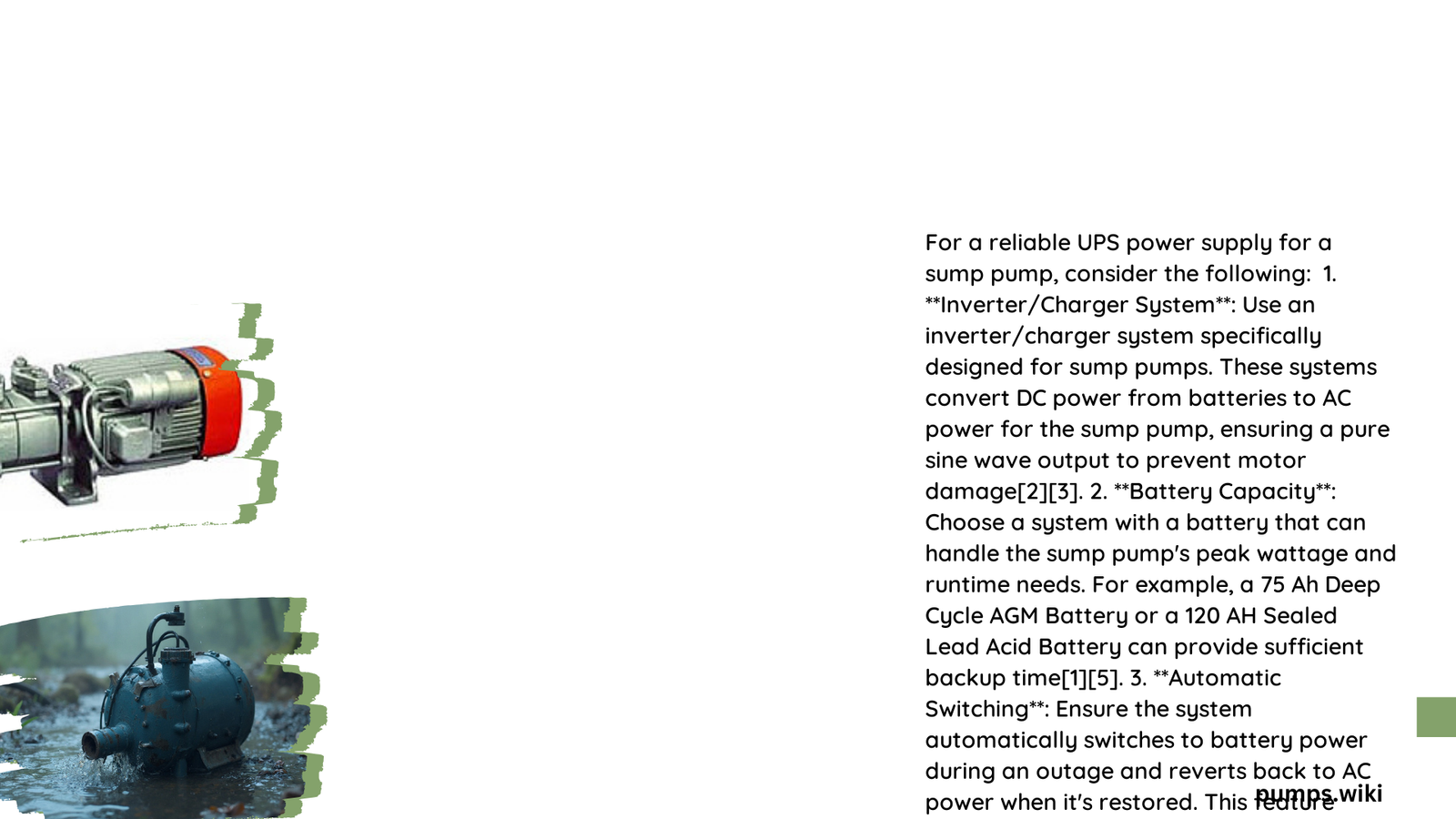A UPS power supply for sump pump is a critical backup system that ensures continuous operation during power outages. It provides uninterrupted power to keep your basement dry and prevent flooding. Choosing the right UPS involves considering factors like pump wattage, runtime requirements, and compatibility. This guide explores optimal UPS capacities, best systems, installation considerations, and efficiency maximization techniques for sump pump applications.
What is the Optimal UPS Power Supply Capacity for Sump Pumps?
Determining the right UPS capacity for your sump pump is crucial for effective operation. Here are the key factors to consider:
Power Consumption and Startup Load
- Running Wattage: A typical sump pump draws about 9.7A at 120V, equating to approximately 1,164W.
- Startup Surge: Sump pumps require at least 2X the running load for startup. For a 1,164W pump, aim for a minimum 2,500VA UPS capacity.
Runtime Calculations
- A 3000VA UPS might provide about 15 minutes of runtime for a 1200W load.
- Additional battery units can extend runtime by approximately 30 minutes each.
Example Calculation
For a sump pump drawing 1,164W continuously:
1. Minimum UPS capacity: 2,500VA (to handle startup and running loads)
2. For extended runtime, consider an inverter/charger system:
– Total watts required (including startup): 1,164W * 1.5 = 1,746W
– Suitable inverter/charger: Tripp Lite UT2012UL (2000 watts) for a 1 ½ hp sump pump
Which UPS Systems are Best Compatible with Sump Pumps?

When selecting a UPS for your sump pump, consider these specifications and features:
Key Requirements
- True Sine Wave Output: Essential for proper motor operation
- High Capacity: To handle startup surges and continuous operation
Recommended Models
- APC SUA2200 Smart UPS:
- Robust option capable of handling inrush current
-
Not ideal for extended runtime
-
Tripp Lite Inverter/Chargers:
- Models: UT750UL, UT1250UL, UT2012UL
- Designed for higher wattage loads
-
UT2012UL supports up to 2000 watts (suitable for 1 ½ hp sump pump)
-
Dedicated Battery Backup Systems:
- Brands: Basement Watchdog, Tripp Lite
- Often more effective and cost-efficient than general-purpose UPS
What are the Compatibility Factors and Installation Considerations?
Ensuring compatibility and proper installation is crucial for optimal performance:
Compatibility Checklist
- [ ] True Sine Wave Output
- [ ] High VA Rating (minimum 2,500VA for typical sump pumps)
- [ ] Sufficient Battery Capacity for desired runtime
Limitations to Consider
- Inrush Current: Standard UPS models may be overloaded by sump pump startup surges
- Runtime: General-purpose UPS systems often provide insufficient runtime for extended outages
Installation Tips
- Place UPS in a dry, well-ventilated area
- Ensure proper grounding and electrical connections
- Consider professional installation for complex setups
How to Run Sump Pumps on Battery Backup Efficiently?
Maximizing efficiency when running sump pumps on battery backup involves several considerations:
Cost Comparison
| System Type | Price Range |
|---|---|
| High-capacity UPS (e.g., APC SUA2200) | $500 – $1000+ |
| Dedicated Backup Systems | $200 – $1500+ |
Maintenance Requirements
- Regular Battery Checks:
- Inspect battery condition monthly
-
Use a maintenance charger with adjustable trickle charge voltage
-
System Inspections:
- Conduct quarterly checks on all components
- Test backup system operation periodically
Potential Challenges
- Extended Power Outages: Consider additional battery capacity or backup generator
- Inrush Current Management: Ensure system can handle high startup loads
What are the Recommended Techniques for Maximizing Efficiency?
To get the most out of your UPS power supply for sump pump:
- Proper Sizing:
- Calculate total wattage requirements (running + startup)
-
Choose a UPS with at least 20% additional capacity
-
Regular Maintenance Schedule:
- Monthly: Battery checks
- Quarterly: Full system inspection
-
Annually: Professional assessment
-
Backup Power Sources:
- Install a backup generator for extended outages
-
Consider solar panels with battery storage for eco-friendly backup
-
Energy Efficiency:
- Use energy-efficient sump pumps to reduce load on UPS
- Implement a smart monitoring system to optimize pump cycles
By following these guidelines, you can ensure your sump pump remains operational during power outages, protecting your property from potential water damage.
